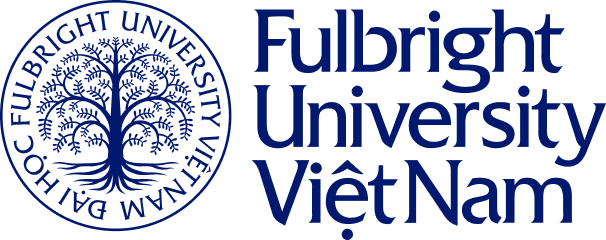
Hán-Nôm is a fascinating yet challenging field in Vietnamese studies. While research on Hán-Nôm may seem limited to the Hán-Nôm Institute and related university departments in Vietnam, a recent cultural exchange event revealed a broader interest. On August 29, 2024, the Vietnam Studies Center hosted a research delegation from Japan and the University of Culture. Many Fulbright students were pleasantly surprised to discover that Japanese Vietnamologists were not only fluent in Vietnamese but also deeply passionate about Hán-Nôm—a creative and demanding linguistic heritage from centuries past.
Vietnam Studies from East Asian Perspectives: A Conversation with Professor Shimizu, Japanese Vietnamologist
Fulbright had the honor of welcoming Professor Shimizu Masaaki, endearingly described by the “Morning Coffee with VTV3” program as “the Japanese professor who enjoys stir-fried water spinach and pickled Vietnamese eggplants.” Speaking fluent Vietnamese, Professor Shimizu inspired many Fulbright students to “study Vietnam, understand Vietnam, and love Vietnam” through his profound affection for Vietnamese language and culture. He also expressed heartfelt gratitude to Dr. Nguyễn Nam, Director of Vietnam Studies Center and Vietnam Studies faculty member at Fulbright University Vietnam, for assisting in his extensive Hán-Nôm research.

Fulbright had the honor of welcoming Professor Shimizu Masaaki, who is a very passionate researcher on Hán-Nôm language.
Professor Shimizu, currently a Vietnamese language lecturer at Osaka University’s Faculty of Foreign Languages, first encountered Vietnamese during his studies at Osaka University in the 1980s. After studying in Hanoi from 1990 to 1991, he returned to Japan to continue his in-depth research on Vietnamese language and Nôm script. His notable projects include studies on Hán-Việt terms in Alexandre de Rhodes’ dictionary, phonetic reconstruction of 15th-century Vietnamese using Nôm materials, and phonological studies of Vietnamese using Nôm script. Professor Shimizu is also known for his unique contributions to the study of Tày-Nôm script, particularly texts related to Tày ethnic rituals.
At the Fulbright exchange, Professor Shimizu introduced his latest work, “Southern Dialect History through Hán-Nôm Materials,” and shared recent discoveries about the Buddhist text “Thiên Địa Bát Dương Kinh” in Nôm script, supported by Dr. Nguyễn Nam. During this visit, he and Dr. Phạm Văn Luân (University of Culture), along with French researchers from the École Française d’Extrême-Orient, conducted field trips to Bến Tre to study and preserve previously unknown Nôm materials of scholar Nguyễn Đình Chiểu, preserved by Mrs. Châu Anh Phụng.
The event also featured other Japanese Vietnamologists, including Dr. Izawa Ryosuke (Shiga University), researching water puppet theater and Hán-Nôm materials, and PhD candidate Uchida Kazu (Osaka University), studying the structure of Nôm script in the “Quốc Phong Thi Tập Hợp Thái.” Through these scholars’ work, Fulbright students gained an “East Asian perspective” on Vietnam and insight into global academic interest in Vietnamese language and culture. Võ Hoàng Bảo Ngân, a third-year Fulbright student, remarked: “I’m deeply impressed by the Japanese scholars’ diligent research, preservation, and study of modern Vietnamese materials. Their work instills pride in my Vietnamese language and enhances my understanding of the cultural exchange between Vietnam and Japan.”
Digitizing Vietnam & Potential Collaborations with Japan
During the event, Vietnam Studies Center introduced Professor Shimizu and Vietnamese researchers to Digitizing Vietnam, a collaborative initiative between Fulbright and Columbia University (USA), funded by a $600,000 grant from the Henry Luce Foundation. Digitizing Vietnam now boasts Vietnam’s largest digital Hán-Nôm archive, with over 2,300 texts from the National Library of Vietnam, Phổ Nhân Pagoda, Thắng Nghiêm Pagoda, and classical texts from the Nôm Foundation such as “Lục Vân Tiên,” “Truyện Kiều,” and poems by Hồ Xuân Hương. In collaboration with the University of Natural Sciences in Ho Chi Minh City, the project is developing digital tools to convert Hán-Nôm image data into text and provide annotations in both Nôm script and Quốc Ngữ.
Upon learning about the Hán-Nôm digital archives at Kyoto and Osaka universities, Dr. Vũ Minh Hoàng, a History lecturer at Fulbright and advisor to Digitizing Vietnam, proposed integrating Japan’s digital Hán-Nôm archives with the Digitizing Vietnam archives. He expressed hope for collaboration between Hán-Nôm researchers in Japan and Vietnam, envisioning them using Digitizing Vietnam’s tools to annotate and decode Hán-Nôm texts, ultimately sharing Vietnamese cultural richness with a wider audience.

Dr. Vũ Minh Hoàng, a History lecturer at Fulbright and advisor to Digitizing Vietnam, proposed integrating Japan’s digital Hán-Nôm archives with the Digitizing Vietnam archives.
Dr. Phạm Văn Luân, a researcher and cultural preservationist at the University of Culture, emphasized the urgent need for digitizing heritage. During the field trip to Bến Tre with Professor Shimizu, he discovered rare Hán-Nôm materials, such as traditional medicinal notebooks deteriorating in high humidity. Dr. Phạm Văn Luân hopes that Fulbright University Vietnam will collaborate with the University of Culture, École Française d’Extrême-Orient, and Japanese researchers to preserve this heritage. In response, Dr. Nguyễn Nam emphasized the collaborative nature of the Digitizing Vietnam Project, stressing that Vietnamese heritage belongs to all and its digitization requires a joint effort across institutions and nations.

Dr. Phạm Văn Luân, a researcher and cultural preservationist at the University of Culture, emphasized the urgent need for digitizing heritage.
The event concluded with Professor Shimizu proposing a student exchange program between Fulbright University Vietnam and Osaka University. The professor is eager for his Japanese students to engage more deeply with Vietnam through learning from the Fulbright community and conducting cross-border Japan-Vietnam research—an endeavor he has passionately pursued for nearly four decades.








